#then i went back to finishing the psalms
Explore tagged Tumblr posts
Text
The unbreakable bond

Chapter 2: the group (part 1)
Jesus x sister x Simon Z
"Z?" I asked my brother as we walked toward eema as we finally found her. As I predicted she was cutting tomatoes on the 'kitchen' table. "Hm, there is another Simon, so we called Simon, Z, get it?" Jesus explained, I looked at him with a look on my face that I'm sure said 'really?', I rolled my eyes, "you could have explained it easier, you know? Anyway, who is the other Simon?" I replied on his question. "Come on, I introduce you to the others", Jesus said while walking toward eema. "So (y/n) this is Mary, mostly known as eema" Jesus started, before I interupted him, "haha, very funny, do you need help eema?" As I turned my attention to eema. Eema smiled at me and then stopped with cutting to give Jesus a hug, Jesus lifted her from the ground. "No (y/n), you can meet the others" eema told me, while returning to cutting tomatoes from the moment Jesus put her back on the dusty floor. I nodded and looked at Jesus, waiting for him to show me around the camp. He just gestured to the camp, with a knowing look that I have no idea what it meant. "Go ahead, I'm gonna pray a bit" Jesus said while shoving me to the direction where everyone was doing stuff. I felt my cheeks reddening as I thought about introducing myself against such a crowd. I inhaled and exhaled deeply. Walking with purpose to the followers.
"Shalom, I'm (y/n), Jesus' sister, oh, I'm sorry I didn't intend to interupt you" I said when I noticed that the two women were reading and writing from a scroll in the tent. "Shalom (y/n), you haven't, we were just finished" the women with the long black hair said with a smile. 'Oh wait, they have both long black hair' I thought while smiling back. "I'm Ramah, this is Mary" the other women said while pointing at Mary. "Ramah and Mary noted" I repeated. "I heard from Jesus, that there were three female followers?" I asked while trying to get a peek from the scroll. "What are you reading?" I added. "Do you know how to read?" Ramah asked. I nodded with a genuine smile. "Tamar is over there, bringing the fruits to Mary, and were reading the psalms of David" Mary aswered my questions. I looked at where my eema has started to cut the onions, Tamar also standing there putting her basket on the table. "So that's Tamar, and I love the psalms!" I exclaimed. As I turned my gaze to look back at the two women I noticed a group of men watching us. I gave them a small smile. "Ah, shalom, your eema just told me that you traveled with her, welcome to the group!" Tamar said while giving me a wide smile. I smiled back. "Shalom, Tamar wasn't it?, I'm so glad that my eema allowed me to come with her" I replied. Before Tamar could answer she was interupted by someone else. "Ladies. Who are you?" A man asked me, while giving Ramah a glance. I looked at Ramah and then at Mary, she softly smiled back. "I'm (y/n), Jesus' sister, and you are?" I questioned him back. His eyebrows went up, he's probably gonna say 'Jesus has a sister?' As I waited for him to reply, Ramah answered in his stead. "Yes, Thomas, she will be joining us on the journey" she said while blushing lightly. 'Okay, there is definitely something on between them' I thought. "Jesus has a sister?" Thomas said with a question in his voice. Ha! See? I knew it. "Hmm" I hummed, the same 'hm', that my brother also do. "Come on, where gonna introduce you to the others." Tamar said, while moving to stand next to me.
*
My head was buzzing, how am I gonna remember who's who? What if I used the wrong name? Why so many? So we had, Thaddeus and Little James, John and Big James, Philip, did I forgot someone? I was panicking to much already. "And this is Simon and his brother Andrew", Mary said while introducing me back to the two brothers. "Shalom." I said for the thousand time that day. The two brothers, just looked at me, why are they looking at me like that? Is there something on my face? I slightly blushed, feeling uncomfortable by their scrutinization. "So your the other Simon?" I said when I remembered what Jesus said earlier. Dazed by my words, Simon crossed his arms and ached an eyebrow. "The other Simon is called 'Z', so there is only one Simon" he said with a flicker of arrogance and annoyance in his voice. "Be nice, Simon" Andrew muttered. He gave me an apologetic smile. I gave him a small smile back. "Are we the last one?" Andrew asked Mary. She shaked her head. "She still has to meet Nathanael, Matthew and Z" she responded back.
#the chosen fanfiction#the chosen x reader#jesus x reader#simon z x reader#the chosen#the chosen jesus x reader#The chosen Simon Z x reader
9 notes
·
View notes
Text

9th October >> Mass Readings (USA)
Wednesday, Twenty Seventh Week in Ordinary Time
or
Saints Denis, Bishop, and his Companions, Martyrs
or
Saint John Leonardi, Priest.
Wednesday, Twenty Seventh Week in Ordinary Time
(Liturgical Colour: Green. Year: B(II))
First Reading Galatians 2:1-2, 7-14 They recognized the grace bestowed upon me.
Brothers and sisters: After fourteen years I again went up to Jerusalem with Barnabas, taking Titus along also. I went up in accord with a revelation, and I presented to them the Gospel that I preach to the Gentiles– but privately to those of repute– so that I might not be running, or have run, in vain. On the contrary, when they saw that I had been entrusted with the Gospel to the uncircumcised, just as Peter to the circumcised, for the one who worked in Peter for an apostolate to the circumcised worked also in me for the Gentiles, and when they recognized the grace bestowed upon me, James and Cephas and John, who were reputed to be pillars, gave me and Barnabas their right hands in partnership, that we should go to the Gentiles and they to the circumcised. Only, we were to be mindful of the poor, which is the very thing I was eager to do. And when Cephas came to Antioch, I opposed him to his face because he clearly was wrong. For, until some people came from James, he used to eat with the Gentiles; but when they came, he began to draw back and separated himself, because he was afraid of the circumcised. And the rest of the Jews acted hypocritically along with him, with the result that even Barnabas was carried away by their hypocrisy. But when I saw that they were not on the right road in line with the truth of the Gospel, I said to Cephas in front of all, “If you, though a Jew, are living like a Gentile and not like a Jew, how can you compel the Gentiles to live like Jews?”
The Word of the Lord
R/ Thanks be to God.
Responsorial Psalm Psalm 117:1bc, 2
R/ Go out to all the world, and tell the Good News.
Praise the LORD, all you nations, glorify him, all you peoples!
R/ Go out to all the world, and tell the Good News.
For steadfast is his kindness toward us, and the fidelity of the LORD endures forever.
R/ Go out to all the world, and tell the Good News.
Gospel Acclamation Romans 8:15bc
Alleluia, alleluia. You have received a spirit of adoption as sons through which we cry: Abba! Father! Alleluia, alleluia.
Gospel Luke 11:1-4 Lord, teach us to pray.
Jesus was praying in a certain place, and when he had finished, one of his disciples said to him, “Lord, teach us to pray just as John taught his disciples.” He said to them, “When you pray, say:
Father, hallowed be your name, your Kingdom come. Give us each day our daily bread and forgive us our sins for we ourselves forgive everyone in debt to us, and do not subject us to the final test.”
The Gospel of the Lord
R/ Praise to you, Lord Jesus Christ.
-----------------------
Saints Denis, Bishop, and his Companions, Martyrs
(Liturgical Colour: Red. Year: B(II))
(Readings for the memorial)
(There is a choice today between the readings for the ferial day (Wednesday) and those for the memorial. The ferial readings are recommended unless pastoral reasons suggest otherwise)
First Reading 2 Corinthians 6:4-10 As dying and behold we live.
Brothers and sisters: In everything we commend ourselves as ministers of God, through much endurance, in afflictions, hardships, constraints, beatings, imprisonments, riots, labors, vigils, fasts; by purity, knowledge, patience, kindness, in the Holy Spirit, in unfeigned love, in truthful speech, in the power of God; with weapons of righteousness at the right and at the left; through glory and dishonor, insult and praise. We are treated as deceivers and yet are truthful; as unrecognized and yet acknowledged; as dying and behold we live; as chastised and yet not put to death; as sorrowful yet always rejoicing; as poor yet enriching many; as having nothing and yet possessing all things.
The Word of the Lord
R/ Thanks be to God.
Responsorial Psalm Psalm 126:1bc-2ab, 2cd-3, 4-5, 6
R/ Those who sow in tears shall reap rejoicing.
When the LORD brought back the captives of Zion, we were like men dreaming. Then our mouth was filled with laughter, and our tongue with rejoicing.
R/ Those who sow in tears shall reap rejoicing.
Then they said among the nations, “The LORD has done great things for them.” The LORD has done great things for us; we are glad indeed.
R/ Those who sow in tears shall reap rejoicing.
Restore our fortunes, O LORD, like the torrents in the southern desert. Those who sow in tears shall reap rejoicing.
R/ Those who sow in tears shall reap rejoicing.
Although they go forth weeping, carrying the seed to be sown, They shall come back rejoicing, carrying their sheaves.
R/ Those who sow in tears shall reap rejoicing.
Gospel Acclamation John 8:12
Alleluia, alleluia. I am the light of the world, says the Lord; whoever follows me will have the light of life. Alleluia, alleluia.
Gospel Matthew 5:13-16 You are the light of the world.
Jesus said to his disciples: “You are the salt of the earth. But if salt loses its taste, with what can it be seasoned? It is no longer good for anything but to be thrown out and trampled underfoot. You are the light of the world. A city set on a mountain cannot be hidden. Nor do they light a lamp and then put it under a bushel basket; it is set on a lampstand, where it gives light to all in the house. Just so, your light must shine before others, that they may see your good deeds and glorify your heavenly Father.”
The Gospel of the Lord
R/ Praise to you, Lord Jesus Christ.
---------------------
Saint John Leonardi, Priest
(Liturgical Colour: White. Year: B(II))
(Readings for the memorial)
(There is a choice today between the readings for the ferial day (Wednesday) and those for the memorial. The ferial readings are recommended unless pastoral reasons suggest otherwise)
First Reading 2 Corinthians 4:1-2, 5-7 We preach Jesus Christ as Lord, and ourselves as your slaves for the sake of Jesus.
Brothers and sisters: Since we have this ministry through the mercy shown us, we are not discouraged. Rather, we have renounced shameful, hidden things; not acting deceitfully or falsifying the word of God, but by the open declaration of the truth we commend ourselves to everyone’s conscience in the sight of God. For we do not preach ourselves but Jesus Christ as Lord, and ourselves as your slaves for the sake of Jesus. For God who said, Let light shine out of darkness, has shone in our hearts to bring to light the knowledge of the glory of God on the face of Jesus Christ. But we hold this treasure in earthen vessels, that the surpassing power may be of God and not from us.
The Word of the Lord
R/ Thanks be to God.
Responsorial Psalm Psalm 96:1-2, 2-3, 7-8, 10
R/ Proclaim God’s marvelous deeds to all the nations.
Sing to the LORD a new song; sing to the LORD, all you lands. Sing to the LORD; bless his name.
R/ Proclaim God’s marvelous deeds to all the nations.
Announce his salvation, day after day. Tell his glory among the nations; among all peoples, his wondrous deeds.
R/ Proclaim God’s marvelous deeds to all the nations.
Give to the LORD, you families of nations, give to the LORD glory and praise; give to the LORD the glory due his name!
R/ Proclaim God’s marvelous deeds to all the nations.
Say among the nations: The LORD is king. He has made the world firm, not to be moved; he governs the peoples with equity.
R/ Proclaim God’s marvelous deeds to all the nations.
Gospel Acclamation Mark 1:17
Alleluia, alleluia. Come after me, says the Lord, and I will make you fishers of men. Alleluia, alleluia.
Gospel Luke 5:1-11 At your command I will lower the nets.
While the crowd was pressing in on Jesus and listening to the word of God, he was standing by the Lake of Gennesaret. He saw two boats there alongside the lake; the fishermen had disembarked and were washing their nets. Getting into one of the boats, the one belonging to Simon, he asked him to put out a short distance from the shore. Then he sat down and taught the crowds from the boat. After he had finished speaking, he said to Simon, “Put out into deep water and lower your nets for a catch.” Simon said in reply, “Master, we have worked hard all night and have caught nothing, but at your command I will lower the nets.” When they had done this, they caught a great number of fish and their nets were tearing. They signaled to their partners in the other boat to come to help them. They came and filled both boats so that they were in danger of sinking. When Simon Peter saw this, he fell at the knees of Jesus and said, “Depart from me, Lord, for I am a sinful man.” For astonishment at the catch of fish they had made seized him and all those with him, and likewise James and John, the sons of Zebedee, who were partners of Simon. Jesus said to Simon, “Do not be afraid; from now on you will be catching men.” When they brought their boats to the shore, they left everything and followed him.
The Gospel of the Lord
R/ Praise to you, Lord Jesus Christ.
3 notes
·
View notes
Text
October 15...
Hey, it's been a thousand forevers since I've been on here. Wonder if my followers and those who follow me still use this. I had to share this. A lot has been happening since 2024, but God remains faithful.
I arrived at work early on this day. I really needed to use the bathroom so I put down my handbag, lunch bag and water bottle, rushed to sign in and headed to the bathroom. When I was through using the bathroom I saw what I thought was pee on the floor, like somehow I splattered pee on the floor in the rush to use the toilet, so I used some hand towel to wipe it. That's when I realised it was oil and not urine. When I looked closely at the hand towel dispenser handle, I also noticed that some oil was on a section of it that my hand did not touch. Due to me noticing that it was oil, I looked at my chair when I got outta the bathroom, noticed it was okay but wiped the desk with wet wipes.
Btw, only the director was in the building, most persons were late and the other lady in the department who was also at work sits on the other side of the building.Remembering that the tissue finished, I called next door to ask for a tissue. The lady told me to come for it. So I went for it. When I came back the director was in the bathroom and was coming out, the door was ajar. When she saw me, she got the key from the male restroom and helped me put the tissue in the dispenser. At this point I wasn't even thinking she had anything to do with the oil thing per se.
When I got back to my seat I noticed three (3) droplets. I grabbed my phone really fast and did a quick video because I couldn't believe what I was seeing. Her office door was also open so I had to move quickly to get the footage. I remained standing and took a wet wipe out of my bag, when a lady came that same time to collect a purchase order to I went to her with the wipe in my hand, but threw it in a bin because I didn't want the documents to get wet. While I was assisting, 2 other persons came. The director passed with her "road purse" and went through the door in this moment. So I thought, this is perfect opportunity to wipe the chair because one of the ladies offered to take over assisting the lady. By the time I got back to my seat, the director came back in, and saw me wiping the chair and held her head straight. I went back to the bathroom to look in the full mirror to look at the back of my dress to see if I sat in any oil before, because I knew that the colour and fabric that made the dress would let me know. There were no soils on the dress. Around midday, the director came to me and asked if she "had anything outstanding for me". Playing it cool, I told her that I was still awaiting an update from the procurement committee regarding a submission I made from early September. Her response was, "I thought I gave you that already", and started rummaging through documents on her admin's desk. Then she went back in her office and closed the door, not providing any information. That to me was also very strange.
Sunday night before this, the scripture I read in family devotion was Isaiah 54. Normally I would read from Psalms, but it's clear that the Lord wanted to remind me ahead of what was coming that, "No weapon that is formed against thee shall prosper; and every tongue that shall rise against thee in judgment thou shalt condemn. This is the heritage of the servants of the LORD, and their righteousness is of me, saith the LORD."God is real, God cares and He protects His children. Since resigning from this organisation, I've come to realise why the Lord gave me the peace and assurance to make that decision. So many evils exist there at the hands of those in authority and they try to intimidate those they feel are a threat to their system. I struggled with the thought of resigning, but realised that I'd only be staying for the wrong reasons that really are not worth my peace of mind; my cup was full. I have roughly 10 days left and I have to trust God to cover me and open my spiritual eyes because these people are not happy. But the Lord's word in Psalm 91 says, "only with thine eyes shalt thou see the reward of the wicked". The Lord is working, if when I can't see it or feel it, He's handling the situation.
2 notes
·
View notes
Note
Can I request both your Lymond fics for WIP meme?
you sure can!!! i mean, you know the one, et ipsi sunt jacula is the not h/c h/c aka the one where an exhausted and overtaxed lymond collapses during the disorderly knights and gabriel is like. let me :) help you :) and. you know. is obviously very helpful and solicitous and just interested in helping lymond feel better! psych.
it's slow-going as all of my lymond fic is, because i get distracted by things that are easier to write and then go back and read what i have and go "oh but this is fun though and also i do enjoy the research bits and the footnotes" so I'll write another 100 words in it and then get distracted again. this ask is nudging me to get back to it and continue that cycle. part of my problem (you may be noticing a theme) is I don't actually know how I'm going to finish the damn thing. maybe I can cheat and just leave it open.
for the curious, "et ipsi sunt jacula" is a line from the vulgate bible, psalm 54:22 (55:22 in a modern bible): "molliti sunt sermones ejus super oleum; et ipsi sunt jacula." according to the RJPS translation, the line can be translated (from the Hebrew) as "his talk was smoother than butter, yet his mind was on war"; the vulgate latin translates more directly as "their speech was softer than oil, but they themselves are (like) arrows."
“Ah,” Lymond said. “Behold, Ganelon.” “Francis,” Gabriel said, in a tone of gentle reproach. “Where do you think you are going?” “To Roncevaux, surely,” Lymond said, “that I will mort en conquérant. If you come to fence, I think I will make poor sport.” “I do not come to fence.” Gabriel closed the distance between them in slow strides; Lymond did not flinch back, but looked up at him, an obstinate cast to the line of his jaw for all his pallor and visible weakness. “But you will make sport nonetheless.” “Sport?” Gabriel shook his head slowly. “No. Why do you assume I am your enemy, Francis?” “Ta suka suka, ten skaphen de skaphen onomason,” said Lymond, unmoved. No flicker of displeasure disturbed the handsome face of the man watching him as he reached out, laying hands on his shoulders.
the second one, haec olim meminisse iuvabit, is (meant to be) a post-series richard and lymond fic, specifically one where richard finds out what happened with khaireddin and the chess game, because I am an absolute sucker for brotherly angst and i think it would make sense of some more of lymond's behavior afterwards. this one came out because i realized that richard didn't know and went "ah, but he should!" and then realized that would make for fun post-series drama as the two of them are figuring out how to have a relationship after all the upheaval throughout the series.
also considering if I want to have marthe still alive just because i can and possibly the answer is yes, because, again, i can.
the title on this one comes from the aeneid: "forsan et haec olim meminisse iuvabit" or, as I translated it in my epigraph, "perhaps someday it will please us to remember even this."
I get to be so pretentious with my lymond titles and I will not stop.
“I assume that Graham Reid Malett is dead.” Richard kept the words short and blunt, but saw no reaction. “Le roi est mort. I killed him in a chess game.” The words were spoken with exact equanimity; Richard cast his gaze sidelong and narrowed, and stayed silent, waiting. The fine-featured face was a mask, inscrutable and unbreakable. “To see the way you look at the boy,” Richard said, “one could not believe that you crossed much of the known world for him.” Lymond was quiet. He propelled himself to his feet, turned, and walked a few steps away, long-fingered hands folding behind his back. “Kuzum is not my son. He is Joleta’s. By her brother.” Richard took a sharp breath. “You are certain?” “Yes.” Lymond’s voice was level, empty of feeling. Richard waited, but he said no more. “Does Philippa know?” “Perhaps. Perhaps not. I haven’t told her. She loves him, and he her.” Richard stood slowly and approached Lymond. “And what of your son?” he asked quietly, almost against his own will. Lymond was silent for a long while, but Richard did not press him, sensing that to do so would be a grave mistake.“Not oats, but wheat of blood...he died,” Lymond said. “In a chess game.”
10 notes
·
View notes
Text
DAILY SCRIPTURE READINGS (DSR) 📚 Group, Fri Aug 02nd, 2024 ... Friday of the Seventeenth Week in Ordinary Time, Year B
Reading 1
----------
Jer 26:1-9
In the beginning of the reign of Jehoiakim,
son of Josiah, king of Judah,
this message came from the LORD:
Thus says the LORD:
Stand in the court of the house of the LORD
and speak to the people of all the cities of Judah
who come to worship in the house of the LORD;
whatever I command you, tell them, and omit nothing.
Perhaps they will listen and turn back,
each from his evil way,
so that I may repent of the evil I have planned to inflict upon them
for their evil deeds.
Say to them: Thus says the LORD:
If you disobey me,
not living according to the law I placed before you
and not listening to the words of my servants the prophets,
whom I send you constantly though you do not obey them,
I will treat this house like Shiloh,
and make this the city to which all the nations of the earth
shall refer when cursing another.
Now the priests, the prophets, and all the people
heard Jeremiah speak these words in the house of the LORD.
When Jeremiah finished speaking
all that the LORD bade him speak to all the people,
the priests and prophets laid hold of him, crying,
"You must be put to death!
Why do you prophesy in the name of the LORD:
'This house shall be like Shiloh,' and
'This city shall be desolate and deserted'?"
And all the people gathered about Jeremiah in the house of the LORD.
Responsorial Psalm
----------------
PS 69:5, 8-10, 14
R. (14c) Lord, in your great love, answer me.
Those outnumber the hairs of my head
who hate me without cause.
Too many for my strength
are they who wrongfully are my enemies.
Must I restore what I did not steal?
R. Lord, in your great love, answer me.
Since for your sake I bear insult,
and shame covers my face.
I have become an outcast to my brothers,
a stranger to my mother’s sons,
Because zeal for your house consumes me,
and the insults of those who blaspheme you fall upon me.
R. Lord, in your great love, answer me.
But I pray to you, O LORD,
for the time of your favor, O God!
In your great kindness answer me
with your constant help.
R. Lord, in your great love, answer me.
Alleluia
--------
1 Pt 1:25
R. Alleluia, alleluia.
The word of the Lord remains forever;
this is the word that has been proclaimed to you.
R. Alleluia, alleluia.
Gospel
-----------
Mt 13:54-58
Jesus came to his native place and taught the people in their synagogue.
They were astonished and said,
“Where did this man get such wisdom and mighty deeds?
Is he not the carpenter’s son?
Is not his mother named Mary
and his brothers James, Joseph, Simon, and Judas?
Are not his sisters all with us?
Where did this man get all this?”
And they took offense at him.
But Jesus said to them,
“A prophet is not without honor except in his native place
and in his own house.”
And he did not work many mighty deeds there
because of their lack of faith.
***
FOCUS AND LITURGY OF THE WORD
I have a friend, who in his third year of high school, got caught stealing a package of cigarettes in his neighborhood drugstore. The owner banished him for ever from the store.
Fourteen years later, the week after his ordination as a Jesuit priest, his mother asked him to go to the same drugstore to get her something. He walked in and the older owner shouted, “I told you never again to come in here!” So he left with a big smile and went to a more welcoming place.
In today’s Gospel for this First-Friday Eucharistic liturgy, Jesus is not only returning to His home town, but is teaching to His old neighbors in their Synogogue. These faithful Jews question among themselves about his wisdom and power. They think they know Him, because they knew His parents and extended family. He had been urging the, by His words, to a more faith-based, more personally relationship with the God of their ancient faith. They resisted Him and His words, because they clung. His life-giving Word-Seeds fell on hard soil and so He moved on where there might be a more welcoming growing area.
Jesus did not need popular-acceptance. He was advancing in holy self-acceptance and so came and went. He was growing in the awareness of Who He was. He did not need any validation for His growing into. It would be attractive and easy for me to fill out this Reflection by writing about our need to grow in self-acceptance, so I won’t.
I write just a closing thought about living with memories of what we thought in the past which have frozen into the comfortable concrete. Memories can form images and we grow holding them tightly against the intrusion of the new, different and so uncomfortable.
Now here’s the punchline. What Jesus really came to do was to change the ideas of God! Imagine that! Once a relationship is concretely comfortable, it is dying and probably dead. So, if we are unmovable and relaxed with our image of Jesus and or the unknowable God, that Jesus and His Father are moving on to more receptive soil.
***
SAINT OF THE DAY
Saint Eusebius of Vercelli
(c. 300 – August 1, 371)
Saint Eusebius of Vercelli’s Story
Someone has said that if there had been no Arian heresy denying Christ’s divinity, it would be very difficult to write the lives of many early saints. Eusebius is another of the defenders of the Church during one of its most trying periods.
Born on the isle of Sardinia, he became a member of the Roman clergy, and is the first recorded bishop of Vercelli in Piedmont in northwest Italy. Eusebius was also the first to link the monastic life with that of the clergy, establishing a community of his diocesan clergy on the principle that the best way to sanctify his people was to have them see a clergy formed in solid virtue and living in community.
He was sent by Pope Liberius to persuade the emperor to call a council to settle Catholic-Arian troubles. When it was called at Milan, Eusebius went reluctantly, sensing that the Arian block would have its way, although the Catholics were more numerous. He refused to go along with the condemnation of Saint Athanasius; instead, he laid the Nicene Creed on the table and insisted that all sign it before taking up any other matter. The emperor put pressure on him, but Eusebius insisted on Athanasius’ innocence and reminded the emperor that secular force should not be used to influence Church decisions. At first the emperor threatened to kill him, but later sent him into exile in Palestine. There the Arians dragged him through the streets and shut him up in a little room, releasing him only after his four-day hunger strike. They resumed their harassment shortly after.
His exile continued in Asia Minor and Egypt, until the new emperor permitted him to be welcomed back to his see in Vercelli. Eusebius attended the Council of Alexandria with Athanasius and approved the leniency shown to bishops who had wavered. He also worked with Saint Hilary of Poitiers against the Arians.
Eusebius died peacefully in his own diocese at what was then considered an advanced age.
Reflection
----------
Catholics in the U.S. have sometimes felt penalized by an unwarranted interpretation of the principle of separation of Church and state, especially in the matter of Catholic schools. Be that as it may, the Church is happily free today from the tremendous pressure put on it after it became an “established” Church under Constantine. We are happily rid of such things as a pope asking an emperor to call a Church council, Pope John I being sent by the emperor to negotiate in the East, or the pressure of kings on papal elections. The Church cannot be a prophet if it’s in someone’s pocket.
***
【Build your Faith in Christ Jesus on #dailyscripturereadingsgroup 📚: +256 751 540 524 .. Whatsapp】
#climate change#astronomy#astrophotography#biology#book quotes#inspirational quotes#marine biology#nasa#relatable quotes#romance quotes#daily scripture readings#daily scripture readings group#CharlesOngole#catholic church
2 notes
·
View notes
Text
BG3 Epilogue spoilers. A very long post.
Found a work around for the Unique Tav mod problem I was having. The epilogue would not trigger if I took the mod out and when I would put it back in then I got a body texture error giving my Tavs a darken grid skin texture. So I didn't take screen shots just played to see what happens. But I got screen shots now baby!!
Something I love about this game is that it gives dates. The game begins the 20th of Eleasis (August) 1492. For this play through it was the 15th of Uktar (November) when I finished the game. Meaning its around mid Mirtul (May) 1493 when the party takes place. The dialogue tab does not reflect the time skip but easy enough to do the math.
So some highlights.

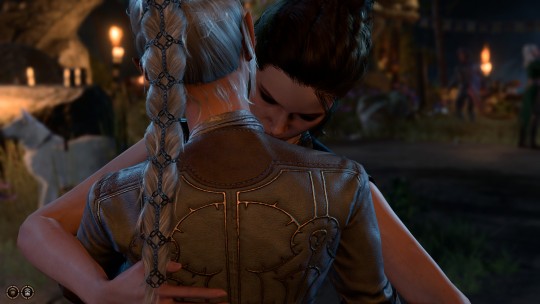
Bro I straight up cried at Shadowheart's conversation. She has a house she has been fixing up, her parents are both still alive. Her father has been helping her take care of her animals and rebuild her home. Her mother has good days and bad but they did make a pie together and Shadowheart actually remembers it from her childhood.
Lark is not a hugging person but Shadowheart and her were close friends and I feel this was appropriate
I love that you can find some Selûnite slippers that are clearly Shadowheart's since she is walking around bare foot and wading into the river.
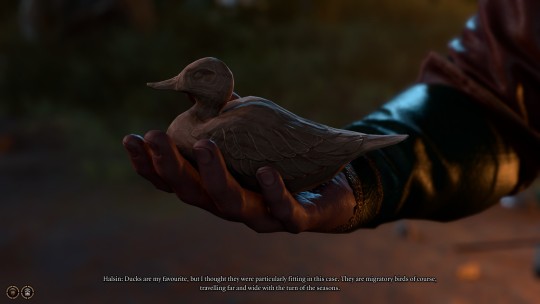
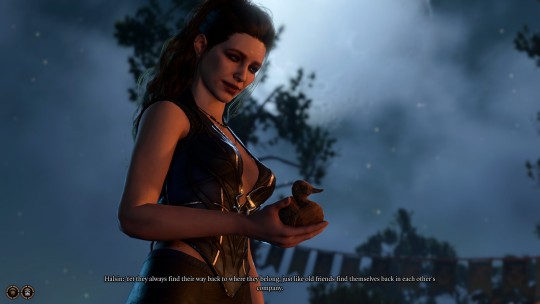
A duck from Halsin! This fits in with headcanon/ttrpg campaign things I have for Lark. She has a carved lark and a carved sparrow, for her and her brother that she found in the remains of her childhood home. The duck with go along side those.

Karlach 😳 ma'am.
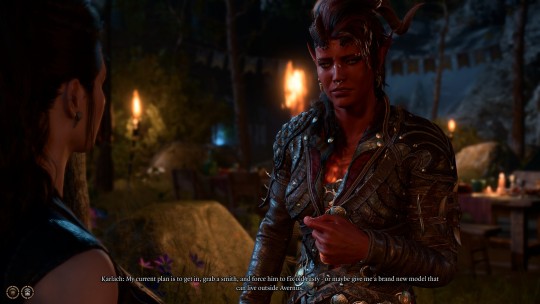
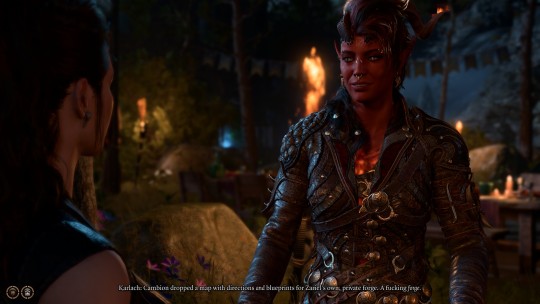
FINALLY Justice for Karlach! Please I need her to come home! Because THIS SHIP NEEDS TO SAIL PLEASE!!!

Confession: for our Descend into Avernus campaign I almost made a barbarian lady who was married to a smith with like five kids back at home. But my party ended up having two paladins so I thought we had enough melee tanks. So I made a divine soul sorcerer instead. And then I played BG3 and THIS! THIS IS MY SHIP!!!
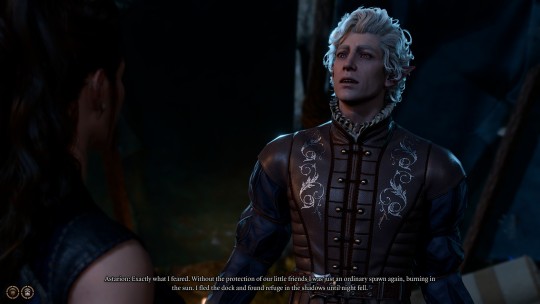

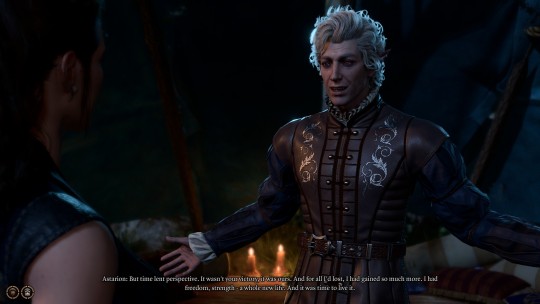
I had been wondering about this. Because I kind of felt really sad for the original Tadfools at the end. Of the original six (seven if you count Tav) only Shadowheart and Gale remained to celebrate their victory that night because of the choices I made. Lae'zel left with the githyanki, Wyll and Karlach had to leave immediately to go to Avernus to save Karlach. And Astarion had to flee into the shadows and didn't show back until the reunion party. Sure there was Minsc, Jaheira, and Halsin. But for this play through it was just Lark, Gale, and Shadowheart sitting around a table in the Elfsong going "damn, so all that happened to us." I have thought a lot about the moment right after defeating the Elderbrain. As I said above we know the game starts in Eleasis and keeps track of how many days go by. How many long rests you take will determined how long the game takes place. So for me the party had the tadpoles and shared thoughts for exactly 80 days. To suddenly not, to sit a cross from someone who you shared something unique and terrifying and to now have the silence of your own thoughts. I find it very interesting and very sad that several of the party were not present to share and come to terms with that moment together.
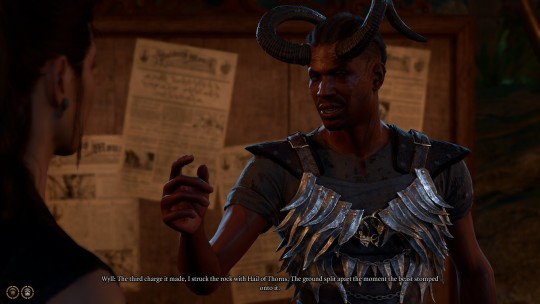
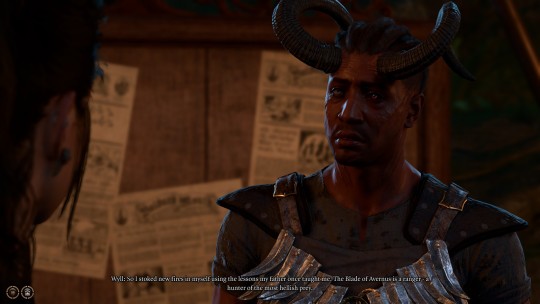
This was actually a bit surprising to me. I was wondering what class Wyll would become after losing his Warlock powers. I had thought a Paladin might suit him. A couple of my play throughs I have even muiltclassed him as a Palock. Fighter would have been my second guess. If you do the other story you find out that his ranger pet is a wolf name Lily! (If you have Wyll as a Duke then he names his adopted daughter Lily. Which is the cutest thing.)
(My Wyllmancer play through Psalm is bugged right now. Wyll, Karlach, and she went to Avernus together and right now all the companions think I romanced Karlach instead of Wyll. 😭)
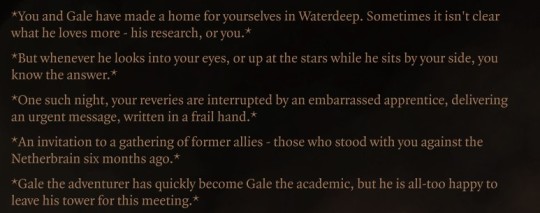
omg I can't believe Lark married a wizard just like her mother. 🙄
Those who might have been reading my posts on Lark will know she was an import from one of my ttrpg campaigns. She is very near and dear to me. I was please that the timeline of our campaign and the timeline of BG3 allowed me to bring her into the game as bit older and more mature woman than she was in our campaign.
Romancing Gale with her was wildly fitting. Lark is the daughter of a Silvermoon trained Wizard and an Wild Magic Sorcerer Uthgardt barbarain (the roman use of the word, not the class.) I won't go too deep into it but its very fitting considering the reason Lark's parents died, it feels like history is righting itself. As Wither might say, balance.
As for Lark's relationship with Gale, she could argue with him passionately about magic. She could make her displeasure in how the gods interfere with morals loud and clear. But most importantly turn him away from the gods influence. What I found really interesting is that for Lark's play through, Gale still has the orb.
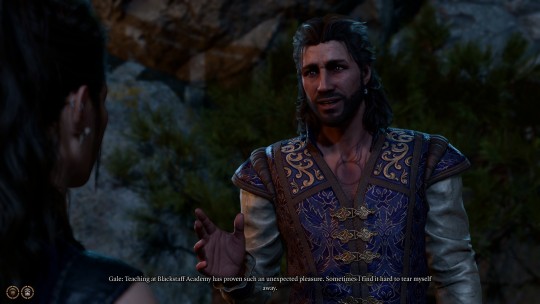
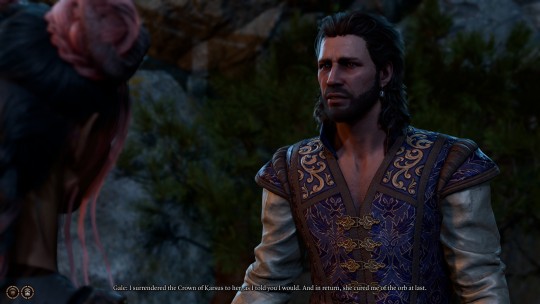
Both Lark and Psalm told Gale to not apologize to Mystra and told him not to try and fish the crown out of the Chionthar. Apparently he didn't listen to Psalm. But for Lark the orb apparently has become inert. Which I approve of a lot, especially for Lark's play through. She would never tell him to try to become a god, nor would she tell him to seek Mystra's forgiveness and to become her chosen again.
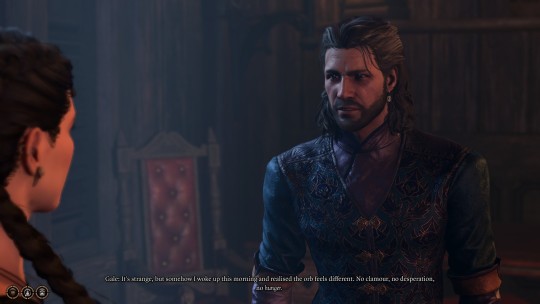
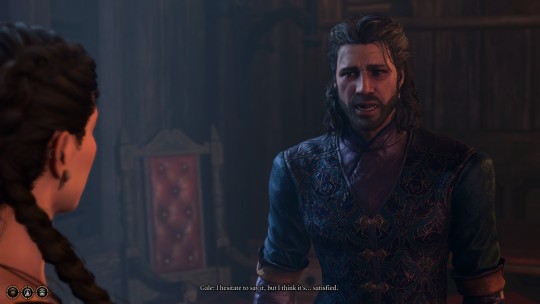
Lark has Wyll philosophy when it comes to the gods. You can't really be agnostic or atheist in Faerûn. But she is as close as you can get without risking ending up in the Wall of Faithless.
Anyways, I think its very cute that Gale has become a professor. He had made a comment wishing to teach if you say he is an apple during the Dryad's newly wed game.

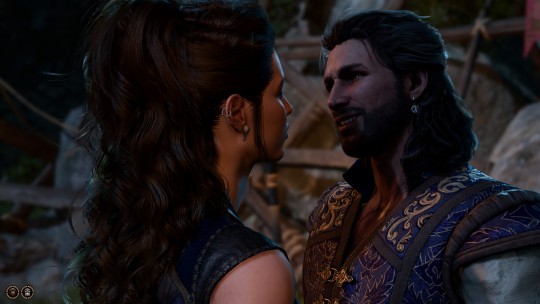


LMAO she leans in for a kiss and he leans away. Sir, she is a sorceress and kind of a mean one at that. She is going to turn you into a frog and put you in a jar.
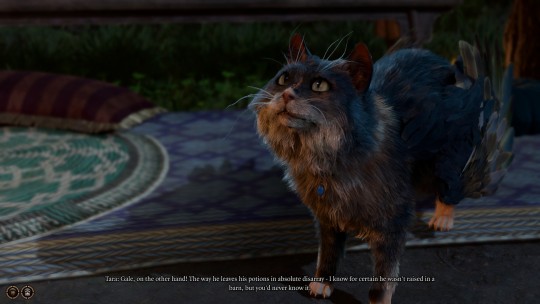
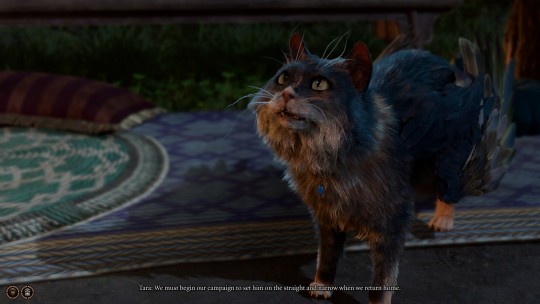
I did take the friendly options with Tara because yeah... after talking to her, yeah Gale is right, they are a lot alike. Tara and Lark conspiring, yeah... yeah that is right.
I did reload to see what she said if you were mean with her and smifomsdfioms the fireballs about to be thrown.

Anyways this is far more than I expected. I thought at best we were going to get the same as DoS2, a slide show of nice art and the narrator telling us what happens. Most of the conversations with the companions were much longer than just a handful of lines. Some of them longer than base game conversations. I am kind of floored by this epiloge.
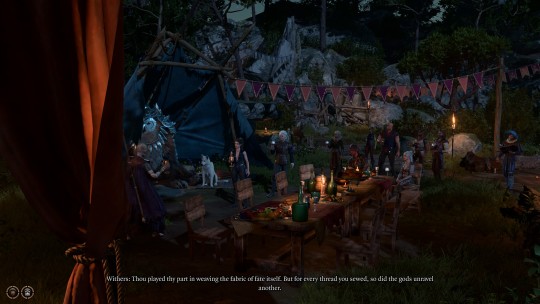

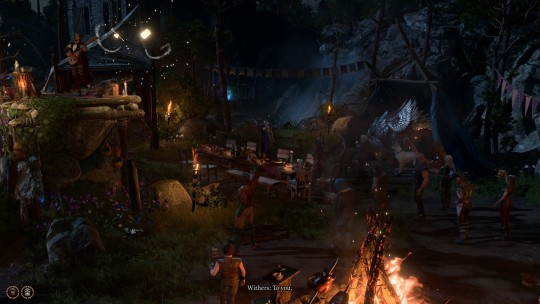
8 notes
·
View notes
Text
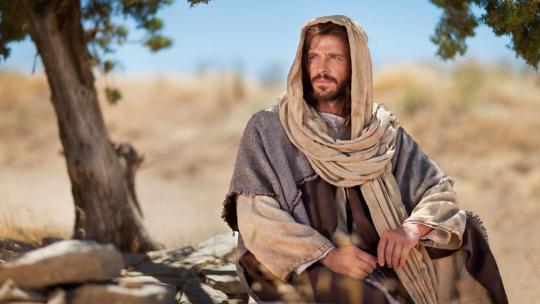
John’s Inquiry (Luke 7:18–23)
1 After Jesus had finished instructing His twelve disciples, He went on from there to teach and preach in their cities.
2 Meanwhile John heard in prison about the works of Christ, and he sent two of his disciples 3 to ask Him, “Are You the One who was to come, or should we look for someone else?”
4 Jesus replied, “Go back and report to John what you hear and see: 5 The blind receive sight, the lame walk, the lepers are cleansed, the deaf hear, the dead are raised, and the good news is preached to the poor. 6 Blessed is the one who does not fall away on account of Me.”
Jesus Testifies about John (Malachi 3:1–5; Luke 7:24–35)
7 As John’s disciples were leaving, Jesus began to speak to the crowds about John: “What did you go out into the wilderness to see? A reed swaying in the wind? 8 Otherwise, what did you go out to see? A man dressed in fine clothes? Look, those who wear fine clothing are found in kings’ palaces. 9 What then did you go out to see? A prophet? Yes, I tell you, and more than a prophet. 10 For this is the one about whom it is written:
‘Behold, I will send My messenger ahead of You, who will prepare Your way before You.’
11 Truly I tell you, among those born of women there has risen no one greater than John the Baptist. Yet even the least in the kingdom of heaven is greater than he. 12 From the days of John the Baptist until now, the kingdom of heaven has been subject to violence,h and the violent lay claim to it. 13 For all the Prophets and the Law prophesied until John. 14 And if you are willing to accept it, he is the Elijah who was to come.
15 He who has ears to hear, let him hear.
16 To what can I compare this generation? They are like children sitting in the marketplaces and calling out to one another:
17 ‘We played the flute for you, and you did not dance; we sang a dirge for you, and you did not mourn.’
18 For John came neither eating nor drinking, and they say, ‘He has a demon!’ 19 The Son of Man came eating and drinking, and they say, ‘Look at this glutton and drunkard, a friend of tax collectors and sinners!’ But wisdom is vindicated by her children.”
Woe to the Unrepentant (Luke 10:13–16)
20 Then Jesus began to denounce the cities in which most of His miracles had been performed, because they did not repent. 21 “Woe to you, Chorazin! Woe to you, Bethsaida! For if the miracles that were performed in you had been performed in Tyre and Sidon, they would have repented long ago inp sackcloth and ashes. 22 But I tell you, it will be more bearable for Tyre and Sidon on the day of judgment than for you.
23 And you, Capernaum, which is lifted up to heaven, will be brought down to Hades! For if the miracles that were performed in you had been performed in Sodom, it would have remained to this day. 24 But I tell you that it will be more bearable for Sodom on the day of judgment than for you.”
Rest for the Weary (Luke 10:21–24)
25 At that time Jesus declared, “I praise You, Father, Lord of heaven and earth, because You have hidden these things from the wise and learned, and revealed them to little children. 26 Yes, Father, for this was well-pleasing in Your sight.
27 All things have been entrusted to Me by My Father. No one knows the Son except the Father, and no one knows the Father except the Son and those to whom the Son chooses to reveal Him.
28 Come to Me, all you who are weary and burdened, and I will give you rest. 29 Take My yoke upon you and learn from Me; for I am gentle and humble in heart, and you will find rest for your souls. 30 For My yoke is easy and My burden is light.” — Matthew 11 | Majority Standard Bible (MSB) The Majority Standard Bible is in the public domain. Cross References: Genesis 50:10; Exodus 4:11; Numbers 12:3; Deuteronomy 28:54; Job 37:24; Psalm 118:26; Proverbs 23:21; Isaiah 14:13; Isaiah 28:12; Isaiah 29:18; Jeremiah 23:14; Joel 3:4; Amos 1:9; Malachi 3:1; Malachi 4:5; Matthew 3:1; Matthew 3:4; Matthew 3:15; Matthew 5:19; Matthew 5:46; Matthew 7:28; Matthew 9:34-35; Matthew 14:5; Matthew 4:12; Matthew 5:29; Matthew 12:20; Matthew 13:9; Matthew 13:21; Matthew 13:43; Matthew 14:3; Matthew 17:10; Matthew 21:26; Matthew 23:7; Matthew 28:18; Mark 1:2; Mark 3:22; Mark 12:38; Luke 1:76; Luke 7:32; Luke 10:13; Luke 16:16; Luke 22:42; John 5:36; 1 John 5:3
#Jesus#messengers#praise#woe#John the Baptist#unrepentant#rest for the weary#Matthew 11#Gospel of Matthew#New Testament#MSB#Majority Standard Bible#John's inquiry#Jesus Testifies about John
3 notes
·
View notes
Text
10/3/2023 DAB Transcript pt1
Jeremiah 1:1-2:30, Philippians 4:1-23, Psalm 75:1-10, Proverbs 24:17-20
Today is the third day of October, welcome to the Daily Audio Bible. I am Brian and it's great to be here with you today as we gather around the Global Campfire and move forward together. So, we have moved into a new week. We have moved into a new month. Now, today, because we finished the book of Isaiah yesterday, we’re moving into a new book in the Old Testament. We’ll also be concluding a letter in the New Testament today. So, movement is happening. So, when we get to the New Testament, we’ll finish the book of Philippians.
Introduction to the Book of Jeremiah:
But now, here at the beginning in the Old Testament, we have reached the beginning of the book of Jeremiah, which is a part of the grouping of books known as the major prophets, just like Isaiah. And Jeremiah is prophesying a couple of decades before and then through the Babylonian attack and conquest. Things that we read about and we're reading in second Kings and second Chronicles, Jeremiah is a prophetic voice during this time. And as with many prophetic voices and prophetic books that are in the Bible, we have these oracles from God. And so, like with Isaiah, we’re jumping around a lot because the things that he had to say were aimed in different directions at different times. So it's not like a linear narrative story; like this happened, then this happen and this happened and this happened. Jeremiah is a book of prophecy so it’s like this as well, but it's intriguing because we…we get a glimpse more into Jeremiah's mindset, and he does not want to be doing some of the things that he's invited to do, especially at the time that he’s invited to do them. And so, there’s an authenticity to Jeremiah that we get to understand and we get to see the frustration of a prophet who thinks nobody is listening and he just wants to be released from the mission. And he wasn't just making it up, Israel had turned her back on God and for more than two decades Jeremiah was one of the only, if not the only voice warning the people that the direction they were going in wasn't going to end anywhere good. They were on the wrong path going in the wrong direction. And this often led Jeremiah to be in conflict with the people. This is a time where there is reasonable prosperity. It doesn't look like there's impending doom. And so, if you know, if business is good but there is a doomsayer, then the doomsayer probably isn't good for business. The business people want people to spend their money right, not be freaked out that something bad is about to happen. And this kind of went up the chain until powerful enough people were just fed up with Jeremiah and all of his interference. So, we’ll watch that even though Jeremiah has frustration and even in tremendous amount of sadness, his loyalty to God remains true. And as it turns out, he was speaking from the Lord and telling the people the truth. Babylon did invade the land in 587 BC. Jerusalem, the holy city, fell. The palace of God that Solomon had made was leveled, completely destroyed. And through it all Jeremiah is there giving words from the Lord to instruct the people how to navigate what is happening and they're not listening. So, with that, we begin one of the most intriguing prophets in the Bible, Jeremiah chapter 1 verse 1 through 2 verse 30 today.
2 notes
·
View notes
Text
The Oil of Joy for Mourning The oil of joy for morning, or the anointing of the Spirit in lieu of that plenteousness of tears which naturally belonged to mourners,2 is a supernatural inner healing anointing from the Holy Spirit for God’s children to apply during their time of mourning.I remember many years ago, I met a sweet-tempered woman who had lost all five of her children in one night during a horrific accident. I was a complete stranger to her, but she opened up to me; for whatever reason, she felt I was a safe person for her to share her deepest hurt in life and the journey she went through to heal.
This inner healing doesn’t mean she forgets her children or that they are no longer an important part of her life. What it does mean is that in His great mercy for her, He goes into the secret crevices of her soul, her mind, and her emotions, and carefully brings her back into the stream of life where she feels safe to open her heart again to others and truly smile, laugh, and even dance again. What He does for this woman He will do for you.
Now, when I met this woman she had a sweet temperament about her, but as she shared that is not the way she was before her healing.
Unfortunately, after the death of her children she turned to alcohol, but it couldn’t take away the pain. It just compounded this deep pain in life.
She blamed God, others, and even herself for the tragedy. She became an angry alcoholic and very dysfunctional.
Before we finish with her testimony, we need to set the record straight on something.
Did God Take Her Children?
To set the record straight we need to look at this tragedy through the eyes of God’s Word. Did God take her children? According to John 10:10, it is the thief, satan, who comes to steal, to kill, and to destroy—not God.
Continuing on in this passage, Jesus tells us that He came to give us life and life in abundance. So let me ask you again, “Did God take her children?” No, He did not; satan did.
But you say, “He allowed it!” What He allows to every person is a free will. The freedom to make choices, both big and small. Sometimes we make wrong decisions, and even a seemingly harmless one can causegrave consequences. So am I saying it’s the fault of humans? Sometimes yes and sometimes no. Quite frankly, putting the blame for a tragedy on God or on a person doesn’t bring healing. What does bring healing is the truth.
What is the truth in these matters? John 16:33 tells us that “in the world you will have tribulation,” meaning in this world we will pass through difficult times, not because God has ordained it but because we have an enemy, satan, who is bent upon our destruction.
If you blame anyone, then you need to blame satan. He is the one responsible. Jesus is your helper in time of need.
Apply the Oil of Joy
Despite her anger, bitterness, and alcoholism, she had a few friends who remained faithfully at her side. Somewhere along the line, her friends had found the greatest healer of all, Jesus Christ. They shared Him with her, and she accepted Him as her Savior and made Him her Lord.
He went into those deep, dark crevices of her soul, and He shed the light of His healing Word and brought her back to the place called “life” where she was again able to smile, laugh, love, function, and even dance again. This did not happen overnight; it was a process. He continued to heal the woundedness of her soul as she allowed Him entrance.
I want to give you these words sung by David in Psalm 30:11, “You have turned for me my mourning into dancing; You have put off my sackcloth and clothed me with gladness.”👏B Dvorak
0 notes
Text
OCTOBER 31, 2024
Guiding Signs
Todd Diedrich (Wisconsin, USA)
"[God] guided them with the cloud by day and with light from the fire all night." - Psalm 78:14 (NIV)
"I like to start my day with a run to clear my mind and to feel refreshed and energized. While I was on a recent early-morning run, I was reminded of God’s great mercy and protection. As I ran, I happened to glance up at the sky and noticed one particular cloud that seemed to be leading me on. It reminded me of the story of God’s using a cloud to lead the Israelites on their journey toward the Promised Land.
I pondered the words from Psalm 78:14 as I finished my run. I believe God reveals to us each day the ways we should go — the ways that are best for us. But are we willing to accept God’s leading? The cloud seemingly led me that morning, and I believe God placed it in the sky specifically for me so that I could recall the goodness and grace that God has given me. Such recollections reassure us that God really is providing direction in our lives." Hod provides for us Signs of His presence and leading.
TODAY'S PRAYER
"Lead us this day, Father, to the place where you need us to go. Help us to experience you in new ways. We thank you for your direction in our lives." Amen.
Exodus 13:17-22
"'17 When Pharaoh let the people go, God didn’t lead them by way of the land of the Philistines, even though that was the shorter route. God thought, If the people have to fight and face war, they will run back to Egypt. 18 So God led the people by the roundabout way of the Reed Sea desert. The Israelites went up out of the land of Egypt ready for battle. 19 Moses took with him Joseph’s bones just as Joseph had made Israel’s sons promise when he said to them, “When God takes care of you, you must carry my bones out of here with you.” 20 They set out from Succoth and camped at Etham on the edge of the desert. 21 The LORD went in front of them during the day in a column of cloud to guide them and at night in a column of lightning to give them light. This way they could travel during the day and at night. 22 The column of cloud during the day and the column of lightning at night never left its place in front of the people."' God provides light so that you can always see ahead. Follow the Light! Bless those who may plot against you. Joe
0 notes
Text
Wednesday of the Twenty-seventh Week in Ordinary Time

Readings of Wednesday, October 9, 2024
Reading 1
GAL 2:1-2, 7-14
Brothers and sisters: After fourteen years I again went up to Jerusalem with Barnabas, taking Titus along also. I went up in accord with a revelation, and I presented to them the Gospel that I preach to the Gentiles– but privately to those of repute– so that I might not be running, or have run, in vain. On the contrary, when they saw that I had been entrusted with the Gospel to the uncircumcised, just as Peter to the circumcised, for the one who worked in Peter for an apostolate to the circumcised worked also in me for the Gentiles, and when they recognized the grace bestowed upon me, James and Cephas and John, who were reputed to be pillars, gave me and Barnabas their right hands in partnership, that we should go to the Gentiles and they to the circumcised. Only, we were to be mindful of the poor, which is the very thing I was eager to do. And when Cephas came to Antioch, I opposed him to his face because he clearly was wrong. For, until some people came from James, he used to eat with the Gentiles; but when they came, he began to draw back and separated himself, because he was afraid of the circumcised. And the rest of the Jews acted hypocritically along with him, with the result that even Barnabas was carried away by their hypocrisy. But when I saw that they were not on the right road in line with the truth of the Gospel, I said to Cephas in front of all, "If you, though a Jew, are living like a Gentile and not like a Jew, how can you compel the Gentiles to live like Jews?"
Responsorial Psalm
PS 117:1BC, 2
R./ Go out to all the world, and tell the Good News.
Praise the LORD, all you nations, glorify him, all you peoples! R./ Go out to all the world, and tell the Good News.
For steadfast is his kindness toward us, and the fidelity of the LORD endures forever. R./ Go out to all the world, and tell the Good News.
Gospel
LK 11:1-4
Jesus was praying in a certain place, and when he had finished, one of his disciples said to him, "Lord, teach us to pray just as John taught his disciples." He said to them, "When you pray, say: Father, hallowed be your name, your Kingdom come. Give us each day our daily bread and forgive us our sins for we ourselves forgive everyone in debt to us, and do not subject us to the final test."
0 notes
Text

8th June >> Mass Readings (Except USA)
The Immaculate Heart of Mary
on
Saturday, Ninth Week in Ordinary Time.
Saturday, Ninth Week in Ordinary Time
(Liturgical Colour: White. Year: B(II))
(Readings for the feria (Saturday))
(There is a choice today between the readings for the ferial day (Saturday) and those for the memorial. The ferial readings are recommended unless pastoral reasons suggest otherwise)
First Reading 2 Timothy 4:1-8 I have run the race to the finish; I have kept the faith; it is time for me to be gone.
Before God and before Christ Jesus who is to be judge of the living and the dead, I put this duty to you, in the name of his Appearing and of his kingdom: proclaim the message and, welcome or unwelcome, insist on it. Refute falsehood, correct error, call to obedience – but do all with patience and with the intention of teaching. The time is sure to come when, far from being content with sound teaching, people will be avid for the latest novelty and collect themselves a whole series of teachers according to their own tastes; and then, instead of listening to the truth, they will turn to myths. Be careful always to choose the right course; be brave under trials; make the preaching of the Good News your life’s work, in thoroughgoing service. As for me, my life is already being poured away as a libation, and the time has come for me to be gone. I have fought the good fight to the end; I have run the race to the finish; I have kept the faith; all there is to come now is the crown of righteousness reserved for me, which the Lord, the righteous judge, will give to me on that Day; and not only to me but to all those who have longed for his Appearing.
The Word of the Lord
R/ Thanks be to God.
Responsorial Psalm Psalm 70(71):8-9,14-17,22
R/ My lips will tell of your justice, O Lord.
My lips are filled with your praise, with your glory all the day long. Do not reject me now that I am old; when my strength fails do not forsake me.
R/ My lips will tell of your justice, O Lord.
But as for me, I will always hope and praise you more and more. My lips will tell of your justice and day by day of your help (though I can never tell it all).
R/ My lips will tell of your justice, O Lord.
I will declare the Lord’s mighty deeds proclaiming your justice, yours alone. O God, you have taught me from my youth and I proclaim your wonders still.
R/ My lips will tell of your justice, O Lord.
So I will give you thanks on the lyre for your faithful love, my God. To you will I sing with the harp, to you, the Holy One of Israel.
R/ My lips will tell of your justice, O Lord.
Gospel Acclamation cf. Luke 2:19
Alleluia, alleluia! Blessed is the Virgin Mary, who treasured the word of God and pondered it in her heart. Alleluia!
(The following reading is proper to the memorial, and must be used even if you have otherwise chosen to use the ferial readings)
Gospel Luke 2:41-51 Mary stored up all these things in her heart.
Every year the parents of Jesus used to go to Jerusalem for the feast of the Passover. When he was twelve years old, they went up for the feast as usual. When they were on their way home after the feast, the boy Jesus stayed behind in Jerusalem without his parents knowing it. They assumed he was with the caravan, and it was only after a day’s journey that they went to look for him among their relations and acquaintances. When they failed to find him they went back to Jerusalem looking for him everywhere. Three days later, they found him in the Temple, sitting among the doctors, listening to them, and asking them questions; and all those who heard him were astounded at his intelligence and his replies. They were overcome when they saw him, and his mother said to him, ‘My child, why have you done this to us? See how worried your father and I have been, looking for you.’ ‘Why were you looking for me?’ he replied. ‘Did you not know that I must be busy with my Father’s affairs?’ But they did not understand what he meant. He then went down with them and came to Nazareth and lived under their authority. His mother stored up all these things in her heart.
The Gospel of the Lord
R/ Praise to you, Lord Jesus Christ.
---------------------------------
The Immaculate Heart of Mary
(Liturgical Colour: White. Year: B(II))
(Readings for the memorial)
(There is a choice today between the readings for the ferial day (Saturday) and those for the memorial. The ferial readings are recommended unless pastoral reasons suggest otherwise)
First Reading Isaiah 61:9-11 I exult for joy in the Lord.
Their race will be famous throughout the nations, their descendants throughout the peoples. All who see them will admit that they are a race whom the Lord has blessed.
‘I exult for joy in the Lord, my soul rejoices in my God, for he has clothed me in the garments of salvation, he has wrapped me in the cloak of integrity, like a bridegroom wearing his wreath, like a bride adorned in her jewels.
‘For as the earth makes fresh things grow, as a garden makes seeds spring up, so will the Lord make both integrity and praise spring up in the sight of the nations.’
The Word of the Lord
R/ Thanks be to God.
Responsorial Psalm 1 Samuel 2:1,4-8
R/ My heart exults in the Lord my Saviour.
My heart exults in the Lord. I find my strength in my God; my mouth laughs at my enemies as I rejoice in your saving help.
R/ My heart exults in the Lord my Saviour.
The bows of the mighty are broken, but the weak are clothed with strength. Those with plenty must labour for bread, but the hungry need work no more. The childless wife has children now but the fruitful wife bears no more.
R/ My heart exults in the Lord my Saviour.
It is the Lord who gives life and death, he brings men to the grave and back; it is the Lord who gives poverty and riches. He brings men low and raises them on high.
R/ My heart exults in the Lord my Saviour.
He lifts up the lowly from the dust, from the dungheap he raises the poor to set him in the company of princes to give him a glorious throne. For the pillars of the earth are the Lord’s, on them he has set the world.
R/ My heart exults in the Lord my Saviour.
Gospel Acclamation cf. Luke 2:19
Alleluia, alleluia! Blessed is the Virgin Mary, who treasured the word of God and pondered it in her heart. Alleluia!
Gospel Luke 2:41-51 Mary stored up all these things in her heart.
Every year the parents of Jesus used to go to Jerusalem for the feast of the Passover. When he was twelve years old, they went up for the feast as usual. When they were on their way home after the feast, the boy Jesus stayed behind in Jerusalem without his parents knowing it. They assumed he was with the caravan, and it was only after a day’s journey that they went to look for him among their relations and acquaintances. When they failed to find him they went back to Jerusalem looking for him everywhere. Three days later, they found him in the Temple, sitting among the doctors, listening to them, and asking them questions; and all those who heard him were astounded at his intelligence and his replies. They were overcome when they saw him, and his mother said to him, ‘My child, why have you done this to us? See how worried your father and I have been, looking for you.’ ‘Why were you looking for me?’ he replied. ‘Did you not know that I must be busy with my Father’s affairs?’ But they did not understand what he meant. He then went down with them and came to Nazareth and lived under their authority. His mother stored up all these things in her heart.
The Gospel of the Lord
R/ Praise to you, Lord Jesus Christ.
2 notes
·
View notes
Text
Calling All Shepherds
John Sawyer
Bedford Presbyterian Church
7 / 21 / 24[1]
Psalm 23
Jeremiah 23:1-6
Mark 6:30-34, 53-56
“Calling All Shepherds”
(No/True Rest for the Weary)
Last month, someone asked me, “So, did you and Amy have a restful vacation?” “Well,” I said, “I mean. . . we were parenting young children in a place different from our home. So, was it restful? I don’t know. We had a really good time, but we’re tired.” “Restful” and “Vacation” are two words that don’t really go together for us in our current season of life. And that’s okay! We signed up for this. Perhaps it would be best to view a concept like “restful vacation” on some kind of spectrum – all the way from “It was fabulous! Life-changing! Never been more happy and more relaxed!” to “Well, we went out of town. And then we came back. And I think we need a vacation after our vacation.” Can you remember the last truly restful vacation you had – an opportunity to get away from it all? Did you come back fully rested – ready to reengage the world – or did you come back feeling like you still need to get away from it all?
Life – with all of life’s blessings – sure can feel relentless sometimes. Maybe you can relate to the relentlessness of responsibilities, and needs, and the firehose of media and other stimuli coming your way. I am reminded of all of this in today’s reading from the Gospel of Mark.
Now, at this point in Mark’s Gospel, the disciples have returned from their missionary journeys. If you remember from a few weeks ago, Jesus has given his twelve disciples authority over unclean spirits and has sent them into the surrounding countryside where they call people to turn toward God and are able to cast out demons and cure the sick. When the disciples return, I imagine that they are excited to share the good news of what has happened. I also imagine that, as they return, they are talking about the tragic death of John the Baptizer (which takes place right before today’s reading, and which – you may remember – we covered last week).
To top it all off, many people are still coming to visit Jesus – so much so that Jesus and his friends are not at leisure to eat.[2] This is not the first time that Jesus and his disciples have not been able to eat because there are so many interruptions. Way back in Mark, Chapter 3, the people crowd around Jesus’ home and keep him from being able to finish a meal.[3]
So, since there has been a lot going on, as today’s text reads, Jesus says to his friends, “‘Come away to a deserted place all by yourselves and rest awhile.’ (Mark 6:30) “Whew! Just what we need,” the disciples must have said, “some space to breathe, and recharge, relax, and renew. Life has been so full, so wonderful, so hard, and we’re so glad that we don’t have to go-go-go, because it’s time for us to stop-stop-stop.”
Years ago, I heard someone preaching on this particular story from the Gospel of Mark – the part where Jesus and the disciples take a break and go to a deserted place. And they used it as a kind of justification, as in, “If Jesus and his disciples needed a break, we do too.” And I think this is true. There is no way for us to do all that we need to do without some rest. But I remember that sermon kind of ending with that idea: “Jesus rested and so should we. Amen.” I guess there is some good news there. It definitely feels good to rest, especially if we are resting from the toils of life. I mean, in the Old Testament – in the Ten Commandments – we are commanded to rest on the Sabbath, because even God rested on the seventh day. But what are we resting for? Is rest, for rest’s sake, sufficient or does rest prepare us for something else.
The text tells us that Jesus and his friends try to get a break. “And they [go] away in the boat to a deserted place by themselves.” (6:32). But the text implies that the break they get isn’t very long, at all. In the very next verse, we are told, “Now many saw them going and recognized them, and they hurried there on foot from all the towns and arrived ahead of them.” (6:33). Imagine booking an all-inclusive vacation at some fancy resort to get a break from work, but when you arrive at the resort, all of the people from work are also there – and they’ve set up a room that resembles your office.
So, Jesus and his disciples can’t seem to get a real break. And there are times – whole seasons of life – when it feels like we can’t get a break, either.
The key moment in today’s story, though – the good news of this story – is what happens next. As Jesus goes ashore, he sees the great crowd, and he has compassion for them. Just so you know, that word “compassion” has a curious meaning in the original language. It can mean, “to have pity or feel sympathy,”[4] but it literally means that Jesus is “moved in the heart” – the seat of human emotions. But for people in Jesus’ day, the emotional heart wasn’t necessarily right here, in the chest. It was lower – in the gut (or, as the Greeks colorfully put it, “the entrails”).[5] The literal translation, here, is, “Jesus was moved [in his entrails, his inner parts] by compassion.”
Have you ever been watching TV and you see the Sarah MacLachlan commercial where she’s talking about pets and you hear that song, [“. . . in the arms of the angels. . . ] and you see these sad puppies on the screen, you just go “Awwww. . .” Or, if you want to raise the stakes with a more urgent example: you are riding in the car and you see a person – a fellow human being – standing out in the summer heat, holding a sign, saying that they are homeless and need money, or water, or food, or a job. You can see with your eyes that they are in dire need of help, but you also feel it in your gut. That’s compassion – that visceral feeling. The question is, if seeing someone else in need causes such a gut response in our bodies, what is the next step? Does it cause us to do anything?
When Jesus sees the crowd, he is moved in his inward parts – or gut – to care for these people, because it’s like they’re wandering around, looking for someone to help them. And so, he gives them what they need. But he doesn’t just give the crowds who are gathered there on the western shore of the Sea of Galilee what they need. Today’s reading tells us that Jesus and his disciples go across – back to the eastern shore of the Sea of Galilee, where Jesus has already healed a man who was possessed by evil spirits. The people in the land of Gennesaret recognize him,
“. . . and rush about that whole region and begin to bring the sick on mats to [him]. And wherever he goes, into villages or cities or farms, they lay the sick in the marketplaces, and beg him that they might touch even the fringe of his cloak; and all who touch it are healed.” (6:55-56)[6]
What today’s readings leave out, is that in between Jesus – weary though he is – seeing all of the people and having compassion on them and then traveling to the other side of the Sea of Galilee to help even more people, Jesus takes time to feeds five thousand men, plus women and children, with five loaves and two fish.[7] There is no rest for the weary, it would seem. There are just too many people out there who need help – like a flock of sheep who have no shepherd.
Could we talk about this term, “shepherd,” for a moment? All three of today’s scripture readings make reference to shepherds. In the Gospel of Mark, we hear that Jesus’ heart breaks for these people because “they are like sheep with no shepherd.” In the famous words of Psalm 23, we hear that the Lord is our Shepherd. And, in the words of the Prophet Jeremiah, we hear the prophet giving a stern warning to so-called “shepherds” – leaders of the people – who destroy and scatter the sheep of God’s pasture. In typical prophetic language, God – through Jeremiah – gives us some good, old fashioned, “Woe to you bad shepherds” language. I do wonder what Jeremiah would have to say, today, to God’s scattered people and those who would purport to lead them. According to Jeremiah, there are plenty of human shepherds who do a terrible job when it comes to shepherding God’s flock. Jeremiah wants to assure us, though, that we should not rely on flawed humans to lead us because God provides another way.
Leaning on the image of God as shepherd that we find in Psalm 23, God says – through Jeremiah –
Then I myself will gather the remnant of my flock out of all the lands where I have driven them, and will bring them back to their fold, and they shall be fruitful and multiply. I will raise up shepherds over them who will shepherd them, and they shall not fear any longer, or be dismayed, nor shall any be missing, says the Lord. (Jeremiah 23:3-4)
Jeremiah then tells us that “the days are surely coming” when God will raise up a “righteous Branch, and he shall reign as king and deal wisely, and shall execute justice and righteousness in the land.” (23:5). Now, it is not clear that Jeremiah intends to point toward Jesus Christ with these prophetic words, but many of us who read these words all these years later might read them in that way.
Contrary to the sermon that I heard long ago, the good news of today’s story from Mark is not that Jesus rested – and we should rest, too. No, the good news of today’s story is that even if we are tired and in need of rest, even if we are surrounded by shepherds who divide and scatter instead of drawing us together, even if we are lost and in need of help and have nowhere else to turn, we have a Shepherd – the Good Shepherd, the Lord who is our Shepherd – who neither slumbers nor sleeps and is always seeking us, always loving us, always finding us where we are and granting peace, and hope, and comfort, and wholeness, and strength, and healing for our weary, scattered souls.
When it comes to showing compassion, Jesus never stops. There will be times when we do need to stop. But Jesus never stops. There will be times when we need help, too, in trying to offer help to others. But Jesus never stops. Offering care can be so challenging, so relentless – so emotionally and physically exhausting. But Jesus never stops.
Well, there is this one moment – snuck right in the middle of today’s two short readings from Mark. Jesus has just fed the five thousand and then he sends his disciples in a boat to the other side of the Sea of Galilee. And then, we are told that, “after saying farewell to them, he [goes] up on the mountain to pray.” (Mark 6:46)
For Jesus – and for us – the only way to offer the care and compassion that the world so desperately needs is preceded and punctuated by prayer. And, for Jesus – and for us – finding a place and time to pray might be a challenge, but it is not impossible.
This past week, after trying to drink from the firehose of current events, and heady headlines, and thinking about the church and who God is calling us to be, and thinking about everything else in my life from family to finances, I found that I needed a minute. Maybe you can relate. And so, I walked across the street to the cemetery on the hill. There are these old cedar trees over there – tall and thick and gnarled in places – and, as I walked up the hill, I saw and heard a family of bluebirds flying around. They were so beautiful. I don’t know what they thought of me, as I sat down in the shade of one of those trees, but I do know that I was reminded – for a moment or two – that there is so much God-breathed-beauty in this world.
And sometimes, I – just like you, and so many others – just need a minute, or two, or twenty of grace, in order to reengage with the world, to dive back into life in all of its messy, needy, relentless, and amazing fullness.
The good news is that we are not alone in all of this – that Jesus Christ, in the fullness of God’s great love, is always at work on our behalf, always at work within us by the power of the Holy Spirit, and always granting us grace upon grace.
May we rely in this grace. May we rest in this grace. And may we rise in this grace to offer ourselves, again and again, in Jesus’ name.
In the name of the Father, and of the Son, and of the Holy Spirit. Amen.
-------
[1] Year B, Proper 11, Ninth Sunday after Pentecost.
[2] See Mark 6:30.
[3] See Mark 3:20.
[4] Walter Bauer, A Greek-English Lexicon of the New Testament and Other Early Christian Literature (Chicago: University of Chicago Press, 1979) 762.
[5] Walter Bauer, 763.
[6] Paraphrased, JHS.
[7] See Mark 6:35-44.
0 notes
Text
First Intro to Judaism
After my first Hebrew class, I had my first Intro to Judaism with Rabbi Tali. The sessions are on Wednesday night, with half an hour for Hebrew and an hour to study the questions of the week. At both of these sessions its a mix of people at different stages of their conversion, from beginners like me to Giorgio and Stephanie, who had finished their conversion process just the day before who hopped on to say hello. They both had their mikvah and went before the Beit Din seperately, then came back together before the Beit Din to be told that they had both successfully completed their conversion. Giorgio then got down one knee in front of the three rabbis and proposed! If there isn't a single mazel tov gif I haven't seen at this point I'll be really surprised, the conversion whatsapp group has been absolutely popping off.
Each week in Intro to Judaism, we explore a different aspect of Judaism, often relating to where we are in the year. This weeks' questions were around the Torah service - we had questions to answer for homework and then went through them together in class. I thought it might be useful to someone out there to have some of those qs here.
1. Why do we sometimes read one scroll and sometimes more? When do we read more than one? And when do we double them up?
The Torah is split into 54 Torah portions (Parshiyot), and we usually read one Torah portion each Shabbat. However, there are 14 Parshiyot that, depending on the year, can potentially be paired together, so two Torah portions would be read on that Shabbat.
2. When does one stand or sit during a Torah service?
Move with the torah, if she's up, you're up!
When the Torah is being read, or when ark is open.
3. What is an aliyah (pronounced aleeyah) and how are you called up?
Aliyah is hebrew for go up, and is when you’re called up to the bimah for a Torah reading. You have to do an aliyah at the conversion ceremony.
The person who receives the aliyah goes up to the bimah before the reading and recites a blessing for reading of the Torah. After the portion of the Torah is read, they do another blessing.
Certain times when someone might receive an aliyah: bar mitzvah, aufruf, before a yahrzeit (anniversary of a parent's death).
5. why does the aron hakodesh (or ark) have two doors?
Lots of possible answers for this one including:
a. The aron hakodesh houses the Torah scrolls. It resembles the Ark in which the stone tablets engraved with the Ten Commandments were kept in the Temple, and the two doors symbolise to the two tablets
b. One is for the written and one is for the oral
c. Rabbi Tali then talked about the symbolism surrounding the Torah, modesty, undress, dress, and asked why do we talk about the torah so erotically?! She went on to say how the Torah needs to be taken care of, treated with intimacy and protection. She went on to talk about a Kaballistic teaching: the opening of the ark as a birth, with the doors as open legs and the Torah is the baby. We carry the Torah very gently, and treated as we would a newborn, even complete with a light kiss. I found it really interesting the Torah is a feminine word in Hebrew so lends itself to being a she.
7. Why is a yad being used?
The word yad in Hebrew means hand, and it is a pointer used by the reader of the Torah to keep their place, and not touch the Torah directly with your hands.
Why not just touch? The librarian answer is don't touch the Torah (or any other delicate paper works) with your bare hands, as the oils in them can be damaging. The Torah is written by hand and incredibly delicate.
The Jewish answer is a bit of a paradox - you will become ritually contaminated if you touch it, not the other way around!
8. why do we process the Torah? what are the psalms sung when we do, and why these psalms?
The Torah contains the books of Genesis, Exodus, Leviticus, Numbers, and Deuteronomy. It is best-known for establishing 613 laws for Jews to live by, which include the Ten Commandments. Many Jews consider the written Torah to be the direct word of God given to Moses.
9. what is the Haftarah and how does it relate to the parasha?
Parasha - weekly torah portion
Haftarah - a conclusion from the prophets, relating to the parasha
The connection between the parasha and the haftarah may hinge on just a word or two. On holidays and special Sabbaths, the haftarah is selected to coincide with the calendar.
The haftarah is a way to linger, we want more of a good thing! Rabbi Tali said that this can be the most passionate part of a service, "I want to get close!" If the service has been bleak, the haftarah will be a bit more uplifting.
10. When did translations of the Torah started being read at synagogues alongside the Hebrew?
Since the beginning, the Torah and Jewish teachings have always been translated so that everyone can understand. Its not catholic church, not everything's in Latin! You're supposed to be able to read, understand and interpret it for yourself.
"Its not rarefied, we're not worshipping the thing, we’re trying to connect with the content."
0 notes
Text
DAILY SCRIPTURE READINGS (DSR) 📚 Group, Wed Oct 09th, 2024 ... Wednesday of The Twenty-Seventh Week in Ordinary Time, Year B
Reading 1
-----------
Gal 2:1-2, 7-14
Brothers and sisters:
After fourteen years I again went up to Jerusalem with Barnabas,
taking Titus along also.
I went up in accord with a revelation,
and I presented to them the Gospel that I preach to the Gentiles–
but privately to those of repute–
so that I might not be running, or have run, in vain.
On the contrary,
when they saw that I had been entrusted with the Gospel to the uncircumcised,
just as Peter to the circumcised,
for the one who worked in Peter for an apostolate to the circumcised
worked also in me for the Gentiles,
and when they recognized the grace bestowed upon me,
James and Cephas and John,
who were reputed to be pillars,
gave me and Barnabas their right hands in partnership,
that we should go to the Gentiles
and they to the circumcised.
Only, we were to be mindful of the poor,
which is the very thing I was eager to do.
And when Cephas came to Antioch,
I opposed him to his face because he clearly was wrong.
For, until some people came from James,
he used to eat with the Gentiles;
but when they came, he began to draw back and separated himself,
because he was afraid of the circumcised.
And the rest of the Jews acted hypocritically along with him,
with the result that even Barnabas
was carried away by their hypocrisy.
But when I saw that they were not on the right road
in line with the truth of the Gospel,
I said to Cephas in front of all,
"If you, though a Jew,
are living like a Gentile and not like a Jew,
how can you compel the Gentiles to live like Jews?"
Responsorial Psalm
---------------
Ps 117:1bc, 2
R. Go out to all the world, and tell the Good News.
Praise the LORD, all you nations,
glorify him, all you peoples!
R. Go out to all the world, and tell the Good News.
For steadfast is his kindness toward us,
and the fidelity of the LORD endures forever.
R. Go out to all the world, and tell the Good News.
Alleluia
---------
Rom 8:15bc
R. Alleluia, alleluia.
You have received a spirit of adoption as sons
through which we cry: Abba! Father!
R. Alleluia, alleluia.
Gospel
--------
Lk 11:1-4
Jesus was praying in a certain place, and when he had finished,
one of his disciples said to him,
"Lord, teach us to pray just as John taught his disciples."
He said to them, "When you pray, say:
Father, hallowed be your name,
your Kingdom come.
Give us each day our daily bread
and forgive us our sins
for we ourselves forgive everyone in debt to us,
and do not subject us to the final test."
***
FOCUS AND LITURGY OF THE WORD
When assigned today’s reading by Luke, I thought – simple enough, I have said the Our Father how many times in my life? Thousands, more likely tens of thousands of times since first learning it as a child. So many times that I, and maybe you, almost take the words for granted due to what may seem like a ritualistic repeating of the same prayer. Well, today’s reflection turned out to be a wonderful opportunity to examine the prayer that Jesus taught us, reflect on its meaning, and maybe better appreciate it and apply it to our spiritual and corporeal lives into the future. As Jesus told his disciples, “When you pray, say:”
Father - First, to call God “Father” tees up the remaining words in the prayer. If God is our Father, then we are certainly his children. And as such, we are not only comforted by His embrace, but rely on Him for guidance, support, and love.
Hallowed be your name - Common definitions of “hallowed” include made holy, consecrated, and greatly revered and honored. When we say “hallowed be your name” we are demonstrating our deep respect and belief that God is above all others not only in name, but in person.
Your Kingdom come– One of my favorite lines in the prayer. We know Matthew adds “your will be done on earth as it is in heaven.” As such, I see this as a rather bold ask of God that He should make our human existence much like that in heaven. And, according to my readings of the teachings of Jesus, I interpret this as man’s (and woman’s) wellbeing on earth – to create a better life for all of us – not just monetarily, but more so spiritually and practically through assuring everyone has food, housing, safety, peace, the opportunity to develop intellectually and spiritually, and treating all humans with dignity and respect. But as we ask for this, we must also understand that God has given us all we need to make this happen. It is often the choices that we, society, and our governments make that do not allow for this to come to fruition. So, as we ask for this, let us also understand the gifts God has given us and the agency we possess to make it happen.
Give us this day our daily bread – We ask God to help us meet our daily needs for food. I believe it is important for us to be thankful that He provides for us and to be empathic towards those who struggle to meet this need and to do what we can to assist God in these efforts.
Forgive us our sings for we ourselves forgive everyone in debt to us – Any amount of reflection allows us to understand that we all sin through actions of commission or omission. And this line is a recognition that we need God’s forgiveness. But we must also forgive others as well since forgiviince I do not believe God ever tempts us. We are really asking for God to give us strength to avoid situations were temptations lie and/or to give us strength in those situations where we are tempted to act against His will.
I hope that the next time we cite the Lord’s Prayer in mass or as part of our own daily prayers, that we remind ourselves that this was the prayer that Jesus taught us when his disciples asked him to “teach us to pray.” When said, possibly use my thoughts above as a catalyst to promote your own meaningful interpretation of this prayer to get closer to God and to fulfill our desire to have His will be done on earth as it is in heaven. Amen!
***
SAINT OF THE DAY
Saint Denis and Companions
(d. 258?)
Saint Denis and Companions’ Story
This martyr and patron of France is regarded as the first bishop of Paris. His popularity is due to a series of legends, especially those connecting him with the great abbey church of St. Denis in Paris. He was for a time confused with the writer now called Pseudo-Dionysius.
The best hypothesis contends that Denis was sent to Gaul from Rome in the third century and beheaded in the persecution under Emperor Valerius in 258.
According to one of the legends, after he was martyred on Montmartre—literally, “mountain of martyrs”—in Paris, he carried his head to a village northeast of the city. Saint Genevieve built a basilica over his tomb at the beginning of the sixth century.
Reflection
-----------
Again, we have the case of a saint about whom almost nothing is known, yet one whose cult has been a vigorous part of the Church’s history for centuries. We can only conclude that the deep impression the saint made on the people of his day reflected a life of unusual holiness. In all such cases, there are two fundamental facts: A great man gave his life for Christ, and the Church has never forgotten him—a human symbol of God’s eternal mindfulness.
Saint Denis is the Patron Saint of:
France
***
【Build your Faith in Christ Jesus on #dailyscripturereadingsgroup 📚: +256 751 540 524 .. Whatsapp】
0 notes
Text
“And you will be My witnesses…”
Today’s reading of the Scriptures from the New Testament is the 1st chapter of the book of Acts:
To a lover of God, Theophilus: In my first book, I recounted the events of Jesus’ life—His actions, His teachings— from the beginning of His life until He was taken up into heaven. After His great suffering and vindication, He showed His apostles that He was alive—appearing to them repeatedly over a period of 40 days, giving them many convincing proofs of His resurrection. As before, He spoke constantly of the kingdom of God. During these appearances, He had instructed His chosen messengers through the Holy Spirit, prohibiting them from leaving Jerusalem, but rather requiring them to wait there until they received what He called “the promise of the Father.”
Jesus: This is what you heard Me teach— that just as John ritually cleansed people with water through baptism, so you will be washed with the Holy Spirit very soon.
When they had gathered just outside Jerusalem at the Mount of Olives, they asked Jesus,
Disciples: Is now the time, Lord—the time when You will reestablish Your kingdom in our land of Israel?
Jesus: The Father, on His own authority, has determined the ages and epochs of history, but you have not been given this knowledge. Here’s the knowledge you need: you will receive power when the Holy Spirit comes on you. And you will be My witnesses, first here in Jerusalem, then beyond to Judea and Samaria, and finally to the farthest places on earth.
As He finished this commission, He began to rise from the ground before their eyes until the clouds obscured Him from their vision. As they strained to get one last glimpse of Him going into heaven, the Lord’s emissaries realized two men in white robes were standing among them.
Two Men: You Galileans, why are you standing here staring up into the sky? This Jesus who is leaving you and ascending to heaven will return in the same way you see Him departing.
Then the disciples returned to Jerusalem—their short journey from the Mount of Olives was an acceptable Sabbath Day’s walk.
Back in the city, they went to the room where they were staying—a second-floor room. This whole group devoted themselves to constant prayer with one accord: Peter, John, James, Andrew, Philip, Thomas, Bartholomew, Matthew, James (son of Alphaeus), Simon (the Zealot), Judas (son of James), a number of women including Mary (Jesus’ mother), and some of Jesus’ brothers.
As the disciples prayed, Peter stood among the group of about 120 people and made this proposal:
Peter: My friends, everything in the Hebrew Scriptures had to be fulfilled, including what the Holy Spirit foretold through David about Judas. As you know, Judas was one of us and participated in our ministry until he guided the authorities to arrest Jesus. (He was paid handsomely for his betrayal, and he bought a field with the blood money. But he died on that land—falling so that his abdomen burst and his internal organs gushed out. News of this death spread to everyone in Jerusalem, so Judas’s property is known as Hakeldama, which means “field of blood.”) In this way, one of David’s psalms was fulfilled: “May their camps be bleak, with not one left in any tent.” But the psalms also include these words: “Let his position of oversight be given to another.” So we need to determine his replacement from among the men who have been with us during all of the Lord Jesus’ travels among us— from His baptism by John until His ascension. We need someone to join us as a witness of Jesus’ resurrection.
The group put forward two men: Joseph (who was also known as Barsabbas or Justus) and Matthias.
Disciples: Lord, You know everyone’s heart. Make it clear to us which of these two is Your choice to take on this ministry as Your apostle, replacing Judas who went his own way to his own destination.
Then they drew lots, and the lot fell to Matthias, so he was added to the eleven apostles to reconstitute the twelve.
The Book of Acts, Chapter 1 (The Voice)
A set of notes from The Voice translation:
Luke, in this his second volume concerning the genesis of the Christian movement, doesn’t preserve Jesus’ teachings during those mysterious meetings with His emissaries after His death. Surely they are filled with joy, curiosity, and amazement as His followers hang on His every word and gaze on the reality of His bodily resurrection as He describes the kingdom of God. His words are undoubtedly intended to prepare each of them for this journey, a journey with a clear destination in sight—the kingdom of God.
An integral part of this kingdom is the activity of the Holy Spirit to empower the people of God as they expand the kingdom beyond the region of Palestine. Luke records surprisingly little about the day-to-day life of these early Christians, about how they integrated their faith into their culture; but he does emphasize the work of the Spirit who empowers miracles and gives believers the means to testify of their faith before Jews and the outsiders.
•
The Creator of heaven and earth is orchestrating a redemptive story that will radically change the course of history. The most significant supernatural event in the history of this newly formed church will be the filling of the Holy Spirit. Through the Holy Spirit, God will direct the church’s growth. But how does the early church make important decisions before the Holy Spirit descends on them?
The company of disciples turns to the practice of “drawing lots,” a practice used by saints for centuries to discover God’s providential leading. After much prayer, Joseph and Matthias most likely write their names on scraps; then someone draws the replacement’s name out of a bag. What seems like a 50/50 chance is, in fact, God’s way of imparting His will. The disciples aren’t putting their faith in “chance”; they are putting their faith in a God who lives. This living God isn’t distant; He is a player in their lives, active when His people seek Him and His will. They know God directs the process, start to finish, and determines whose name is drawn to join the eleven.
Today’s paired reading from the First Testament is the 34th chapter of the book of Genesis:
One day Dinah, Leah and Jacob’s daughter, went out to visit some of the women who lived in the land. But when Shechem (son of Hamor the Hivite, prince of the region) saw Dinah, he grabbed her and raped her. His soul was drawn to Dinah, Jacob’s daughter. He fell in love with her and spoke tenderly to her. Shechem went then and spoke with his father, Hamor.
Shechem: I need you to arrange for this girl to be my wife.
Now Jacob found out that Shechem had dishonored and raped his daughter, Dinah, but at the time, all of his sons were out in the field working with the livestock. So Jacob stayed calm and did not react until they came back. Meanwhile Hamor, Shechem’s father, had come to speak with Jacob to arrange a marriage. When news of the attack reached Jacob’s sons, they came in from the field. The young men were appalled and extremely angry because Shechem had done such a horrible thing in Israel by raping Jacob’s daughter. Something like this should never happen.
Hamor tried speaking with them.
Hamor: My son’s soul longs for your daughter. Please give her to him in marriage. In fact, let’s intermarry our families. Give your daughters to us, and take our daughters for yourselves. We’ll live together. The entire land will be open to you. You can live on it, trade on it, and buy property on it.
Shechem (to Jacob and his sons): Please, let me find my way into your favor! Whatever you ask, I will give it to you. Set the bride-price and gift as high as you like, and I will give you whatever it takes. Just please allow me to marry the young woman.
Jacob’s sons were still angry that Shechem had defiled their sister Dinah, so they answered him and his father Hamor deceitfully.
Jacob’s Sons: We can’t agree to this arrangement: to give our sister to someone who isn’t circumcised would bring shame on all of us. We will consent to allow you to marry our sister on one condition: you must be circumcised as the rest of us have been. Every male among you must be circumcised. Then we will give our daughters to you and will take your daughters for ourselves, and we will live with you in peace and become one people. But if you don’t agree to this condition and be circumcised, then we will take our sister and go.
Hamor and his son Shechem were willing to go along with the demand, and the young man wasted no time in fulfilling the requirement since he was so taken with Jacob’s daughter. Now he was the most honored man in all of his family, so Hamor and his son Shechem went to the gate of the city and addressed all of the men.
Hamor and Shechem (to the men of the city): These men are peaceful and friendly to us, so let’s allow them to live in the land and trade in it. You see this land is large enough for them too. Let’s take their daughters in marriage, and let’s give them our daughters. They will agree to live among us in peace and become one people on one condition: every male among us must be circumcised, just as they already are. Wouldn’t we have much to gain—their livestock, property, and animals? Let’s agree to their condition, and they will live among us and increase the vitality of our city.
So everyone who passed by the city gate listened to Hamor and his son, Shechem, and they all were circumcised—every single man who went out the city gates that day. Three days later, when the men of the city were still in pain, two of Jacob’s sons (Dinah’s brothers Simeon and Levi) took their swords and attacked the unsuspecting people of the city, killing all of the men. They killed Hamor and his son Shechem with the sword as well; they took Dinah out of Shechem’s house—where she had remained during the negotiations—and then went away. Jacob’s other sons saw those who were killed, and they plundered the city. All of this was done in anger, because it was here that their sister had been raped and the family dishonored. They took all of the flocks, herds, donkeys, and whatever was in the city and the field. All of their wealth, all of their children, and all of their wives—everything they could find in the houses—they plundered and made it their own.
Jacob (reacting to Simeon and Levi): You have brought a lot of trouble to me. The people of this land, the Canaanites and the Perizzites, can smell the stink of my sons’ actions. I don’t have huge armies of men to defend us. If they all decide to gather against me and attack me, I will be destroyed along with my entire household.
Simeon and Levi: Would you rather have our sister treated as a whore?
The Book of Genesis, Chapter 34 (The Voice)
A link to my personal reading of the Scriptures for friday, April 5 of 2024 with a paired chapter from each Testament (the First & the New) of the Bible along with Today’s Proverbs and Psalms
A post by John Parsons about a divine searching of the heart:
The phrase "mitzvah haba'ah ba'aveirah (מִצְוָה הַבָּאָה בַּעֲבֵירָה) means a mitzvah that (indirectly) comes about by means of a transgression of another mitzvah. The sages cite the example of working on the Mishkan during the Sabbath day because even though working on the Sanctuary is indeed a blessing, it is not truly so if it violates God's will (Exod. 35:1-2). The sages liken this to making bread from stolen wheat -- and then reciting the "ha'motzi" blessing over the bread! (Bava Kamma 94). Likewise, giving tzedakah that has been gained through illicit means (such as stealing) is forbidden, as is the offering of any sacrifice that is defective or unwanted (Deut. 15:21).
Such considerations reveal that there are "weightier matters" of Torah, and therefore Yeshua warned against making a pretense of obedience at the expense of what is more important to God's heart. For example, tithing "mint and cummin" should not preempt the duty to care for the welfare of parents who are in need (Luke 11:42; Mark 7:9-13). Nor should “religious” activities be regarded as a substitute for surrender of the heart. On the other hand, working to pull a sheep that has fallen into a well on the Sabbath is more important than disregarding the suffering of the animal and the loss to the owner (Matt. 12:11). After all, what good is keeping a commandment in a selfish or self-serving way? Holiness is not about self-preservation as much as surrender. We must always remember that God looks upon the heart and "tests the reigns" (Psalm 7:9; Jer. 17:10).
The attitude of the heart (יַחַס לֵב) is essential. In ancient Hebrew, the "kidneys" (i.e., keliyot: כְּלָיוֹת) were thought to produce the "gut feelings" or "inner life” of a person, perhaps because they filtered the blood. Indeed your attitude and affections are foundational to the Torah of life. John Calvin wrote: "The Law is kept only when men are just and kind and true toward each other, for thus they testify that they love and fear God." In Jewish thinking, the basic respect for others is sometimes called "derekh eretz" (דֶּרֶך אֶרֶץְ).
We have to be careful not to miss the goal of our redemption, which is to become sanctified by embracing the heart, vision, and character of our Lord (Lev. 11:44). Yeshua is the pattern, and his life was unquestionably marked by qualities of mercy, forgiveness, and love. He overlooked our sins and transgressions by focusing on the weightier matters of our need for healing and reconciliation with God. On the other hand, he receives us as his children and therefore we will undergo "scourging" or testing of our "kishkas" (Deut. 8:5; Heb. 12:6). Indeed the Lord will allow "scorching" experiences by which our character defects are exposed and through which we may be refined by teshuvah. In the furnace of trials, God will separate us from our bad qualities, lifting off the dross to reveal the clear brilliance of his heart within us. As C.S. Lewis once said, "God does not love us because we are good, but God will make us good because He loves us." Amen.
[ Hebrew for Christians ]
========
Jeremiah 17:10 Hebrew:
https://hebrew4christians.com/Blessings/Blessing_Cards/jer17-10-jjp.mp3
Hebrew page:
https://hebrew4christians.com/Blessings/Blessing_Cards/jer17-10-lesson.pdf

4.4.24 • Facebook
from yesterday’s email by Israel365:
We live in a time when there are powerful political forces that continue to deny the claims of the nation of Israel to the entire land of Israel. Sometimes this puts Israel and the Jewish people into conflict with the nations of the world. These contentious relationships can appear to run counter to the ultimate Jewish mission to be what Isaiah called, “a light unto the nations.” But as God told Isaac, this concern is unfounded. Laying claim to the land of Israel will ultimately only serve to facilitate the mission of Israel. To bring blessing to all the families of the earth.
Today’s message (Days of Praise) from the Institute for Creation Research
April 5, 2024
Strong and Courageous
“And David said to Solomon his son, Be strong and of good courage, and do it: fear not, nor be dismayed: for the LORD God, even my God, will be with thee; he will not fail thee, nor forsake thee, until thou hast finished all the work for the service of the house of the LORD.” (1 Chronicles 28:20)
This admonition—to be strong and of good courage—is found 11 times in the Bible—thrice on the lips of Moses, five times in Joshua, then twice from David, and once from Hezekiah. Although these all involved specific challenges confronting God’s people at the time, the principles behind them indicate the need for courage of conviction for God’s people at all times.
The first occurrence is in the command given by Moses to the Israelites just before his death as they were about to enter the promised land. “Be strong and of a good courage, fear not, nor be afraid of them: for the LORD thy God, he it is that doth go with thee; he will not fail thee, nor forsake thee” (Deuteronomy 31:6). In the next verse, Moses gave a similar exhortation to Joshua, their leader.
The next-to-last occurrence is in our text, containing almost the same words as in the first occurrence, with David this time exhorting Solomon to build the great temple in Jerusalem. Whether entering a new field of service for God or beginning a great work for God, the people of God will encounter opposition and must be strong and courageous to carry it through.
The word “courage” occurs more in Joshua than in any other book of the Bible, and this specific exhortation is given five times: three by God, once by the people to Joshua, and once by Joshua to the people. In all these, the context stresses obedience to the Word of God, especially in resistance to sin and pagan belief systems. Especially significant is God’s command: “Be thou strong and very courageous, that thou mayest observe to do according to all the law...that thou mayest prosper” (Joshua 1:7). HMM
0 notes